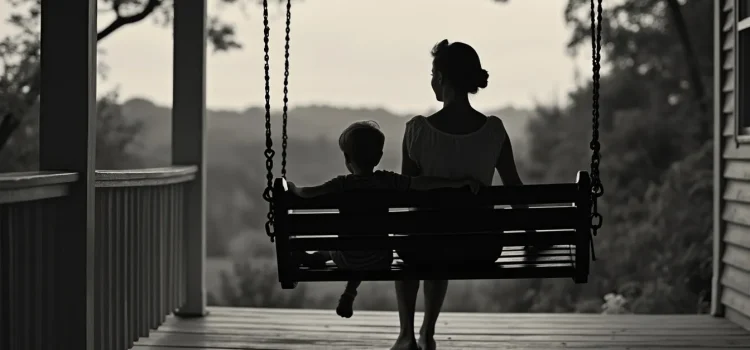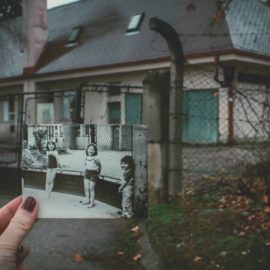

This article is an excerpt from the Shortform book guide to "Gambler" by Billy Walters. Shortform has the world's best summaries and analyses of books you should be reading.
Like this article? Sign up for a free trial here.
What was Billy Walters’s childhood like? How many times has he been married? What impact did his imprisonment have on his family?
Billy Walters’s journey from rural Kentucky to becoming a legendary figure in business and sports betting is filled with dramatic highs and lows. His story reveals how early exposure to gambling and alcohol shaped his path through addiction, multiple marriages, and eventual redemption.
Keep reading to learn about Billy Walters’s family life and other aspects of his extraordinary personal journey.
Walters’s Childhood & Adolescence
When he was a child, Billy Walters’s family life was marred by poverty and the absence of a father figure, as his own father died when he was 16 months old. We’ll delve deeper into Walters’s early life, exploring what his childhood looked like in rural Kentucky and how his adolescence shifted after he moved with his mother to Louisville.
Childhood in Rural Kentucky
Walters was born in 1946 and grew up in extreme poverty in rural Kentucky. According to Walters, he was regularly exposed to alcohol and gambling even as a child. That exposure, along with a family history of addiction, laid the foundation for his later alcoholism and gambling addiction.
Walters writes that a neighbor offered him moonshine—a strong, traditionally homemade liquor and a Kentucky staple—when he was only 10 years old. Around the same age, he began spending hours in local pool bars, where grown men regularly drank alongside him and his friends.
He adds that sports betting was a common pastime in these bars, so they marked his introduction to the gambling world. In one instance, Walters bet $125 on the New York Yankees to win the 1955 World Series; at the time, that $125 represented all the money he’d saved up from mowing lawns and other odd jobs around town. The Yankees lost, and therefore so did Walters.
(Shortform note: According to psychologists, a key part of addiction is that an addict will continue using a substance (like alcohol) or engaging in a behavior (like gambling) despite negative consequences. The fact that Walters continued gambling after losing his entire savings suggests that he was already addicted to gambling even at that young age.)
| The Causes of Addiction: Nature Versus Nurture Exactly how and why people develop addictions has long been a subject of debate and scientific study—is addiction genetic, or is it the result of a person’s experiences and choices? Today, most researchers say that it’s a combination of both. In The Gene, biologist and physician Siddhartha Mukherjee says that the vast majority of a person’s characteristics and behaviors result from the interplay between genetic makeup (genetics) and environmental influences (life experiences). In other words, it’s not a matter of “nature versus nurture,” but one of nature and nurture. Mukherjee explains that genetic factors often make people more likely to behave in certain ways (such as excessive drinking and gambling), but these tendencies would never manifest without environmental triggers. For instance, someone with a genetic predisposition to alcoholism—like Walters—would still never develop the condition if they don’t start drinking. Therefore, it was the combination of Walters’s genetic risk factors and the environment of drinking and gambling he grew up in that led to his dual addictions. |
Adolescence in Louisville
Walters says that he moved to Louisville, Kentucky at age 15 to live with his mother and remained there until he was 19. While in Louisville, his adolescence came to a quick end: He became a father at age 17, married his girlfriend Sharon, and worked two full-time jobs, all while successfully finishing high school.
(Shortform note: For Walters to have graduated high school after becoming a father is commendable, let alone while working two jobs at the same time—studies suggest that teenage fathers are 25-30% less likely to graduate high school than their childless peers. The good news is that teen pregnancy and childbearing rates have dropped significantly since Walters’s adolescence. In the late 1950s, roughly 96 out of every 1,000 women in the US (9.6%) would become pregnant at some point in their teens; by the year 2000 that number had dropped to 49 out of 1,000, or 4.9%.)
After graduating from high school, Walters began blue-collar work at a metal factory to support his wife and their infant daughter. While there, he also leaned into gambling to earn additional income. He became a bookmaker (commonly called a “bookie”) and took bets from his coworkers on local horse races. He even offered small payday loans (typically $10) that allowed his coworkers to bet on credit, then pay him back with interest once they got their paychecks. Between this supplemental gambling income and a promotion at work, Walters was able to buy a house at the age of 19.
(Shortform note: Payday loans (short-term loans with extremely high interest rates) and gambling are two industries that commonly target low-income individuals such as blue-collar factory workers. Furthermore, both of these industries contribute to the cycle of poverty by extracting what little money low-income people do have. While Walters’s small-time bookmaking and $10 loans are fairly low-stakes examples of this, they do illustrate how he was able to prey on his coworkers and bring in extra income at their expense.)
(Shortform note: While becoming a homeowner at 19 is impressive by any metric, it was significantly easier to buy a house in the 1950s than it is today. When Walters bought his first home, the average cost of a house in the US (adjusted for inflation) was approximately $209,000. In 2024, the average house cost around $495,000. This means that, for the average person, becoming a homeowner in the 2020s is more than twice as difficult as it was in the 1950s.)
Divorce From Sharon and Marriage to Carol
Walters admits that he drank heavily to cope with the stress of supporting a family at such a young age. Moreover, his gambling began to spiral out of control, and he lost tens of thousands of dollars playing craps and pool at local bars.
Ultimately, Walters’s addictions led Sharon to file for divorce after four years of marriage. The day after their divorce was finalized, Walters—now 21 years old—married Carol Brown. Carol gave birth to their son seven months later.
(Shortform note: While drinking to cope with stress is a fairly common practice, it often does more harm than good, as it did in Walters’s case. Long-term alcohol abuse can cause anxiety or make existing anxiety worse, exacerbating the very problem it was intended to help with. A similar pattern can be seen in gambling addiction: People who gamble in pursuit of the dopamine hit that makes them temporarily happy often just create more stress for themselves, both due to their uncontrolled behavior and from losing large amounts of money like Walters did.)
Walters’s Young Adulthood and Career
Walters’s time as a young adult was characterized by endless work; he had to make child support payments to Sharon, support his new family with Carol, and sustain his gambling addiction. We’ll explore how Walters became extraordinarily successful as a car salesman and bookmaker before spiraling into debt, divorcing Carol, and moving to Las Vegas with his third wife, Susan.
(Shortform note: Data shows that more than 60% of second marriages in the US end in divorce. Psychotherapist Stacian Watts says this is because divorcees tend to leap into a second marriage without taking time to reflect on what went wrong with their first one, and how they contributed to the divorce. As evidenced by the fact that Walters married Carol on the first day he was legally able to do so (the day after his divorce with Sharon was finalized), it seems likely that he also fell into this trap. Indeed, his second marriage fell apart for much the same reasons as his first.)
Experience in the Automotive Industry
Although Walters suffered from gambling and alcohol addictions in his early 20s, he enjoyed great financial success as a car salesman in the automotive industry. By age 20 he was the most prolific car salesman in Kentucky; he earned $56,000 in commissions in 1966, the equivalent of $500,000 in 2023.
(Shortform note: To put Walters’s earnings in perspective, some articles from the 2020s estimate that an average car salesperson could make anywhere from around $32,000 to around $79,200 per year. Walters’s inflation-adjusted earnings of $500,000 suggest that he’d still be one of the most successful car salesmen not just in Kentucky, but in the entire US.)
Walters then leveraged his experience as a car salesman to start a wholesale used-car business called Taylor Boulevard Auto Sales in 1972. His strategy was simple: He bought used cars on credit, then quickly resold them to pay the banks back and turn a profit for himself. At his peak, Walters made the 2023 equivalent of $5.5 million in a single month.
(Shortform note: Walters sold off Taylor Boulevard Auto Sales before leaving Kentucky, but even today, he’s not completely out of the automotive industry. Walters is the founder and CEO of BW Auto Ventures, a company that owns and operates numerous car dealerships in Kentucky and Georgia.)
Divorce From Carol & Marriage to Susan
Walters writes that, even as his career exploded, his personal life was crumbling as he continued to gamble at increasingly higher stakes. The critical moment occurred when his and Carol’s then-seven-year-old son was diagnosed with a terminal brain tumor. The news caused Walters to spiral, drink more heavily than ever, gamble away his money on blackjack, and ultimately default on his bank loans.
Although their son survived despite tremendous odds, Carol divorced Walters in 1976 because of his out-of-control behavior. That same year, Walters married his third wife, Susan, and was still married to her in 2023 when Gambler was published. He credits the success of his third marriage to his decision to quit drinking, a commitment he made following the death of a close friend in the 1980s.
(Shortform note: Addiction—whether to alcohol or to gambling—puts a great deal of strain on family relationships. Addicts are often emotionally distant because they’re more interested in their addiction than in their family. Addiction also tends to erode trust, as addicts are often secretive, trying to feed their addictions without their loved ones finding out. They also may suffer from psychological and behavioral side effects, particularly if their addiction involves substance abuse; for instance, people who abuse alcohol as Walters used to do can turn angry and abusive, even if they never showed such behaviors before. Therefore, it’s reasonable for Walters to credit the success of his third and final marriage to his decision to give up drinking.)
Prison & Its Aftermath
In 2017, Walters was sentenced to five years in prison for insider trading. He was released a year early when then-president Donald Trump commuted his sentence in 2021.
(Shortform note: The Trump administration cited Walters’s reputation and philanthropic work—in addition to the fact that he’d already served the majority of his sentence—in the official statement about Walters’s pardon. As one example of his philanthropy, Walters and his wife Susan were named the Las Vegas Philanthropists of the Year in 1997, and they’ve continued to support various charitable organizations since then.)
Walters writes that prison drastically shifted his approach to life. In particular, it taught him not to take his life or his loved ones for granted. Billy Walters’s family became ever more important to him. This is true especially regarding his wife Susan, who stayed married to him and visited him often while he was in prison. He also writes that he prioritizes spending time with old friends, since he knows that many of them won’t be around much longer.
Exercise: Reflect on Billy Walters’s Life
- How familiar were you with Walters’s life before reading this? Had you heard about his impoverished upbringing?
- What did you find most surprising about Walters’s account of his life?

———End of Preview———
Like what you just read? Read the rest of the world's best book summary and analysis of Billy Walters's "Gambler" at Shortform.
Here's what you'll find in our full Gambler summary:
- How a man born into poverty made over $100 million
- The three components of Billy Walters’s winning approach to sports betting
- Why Billy Walters went to prison and what he learned there






